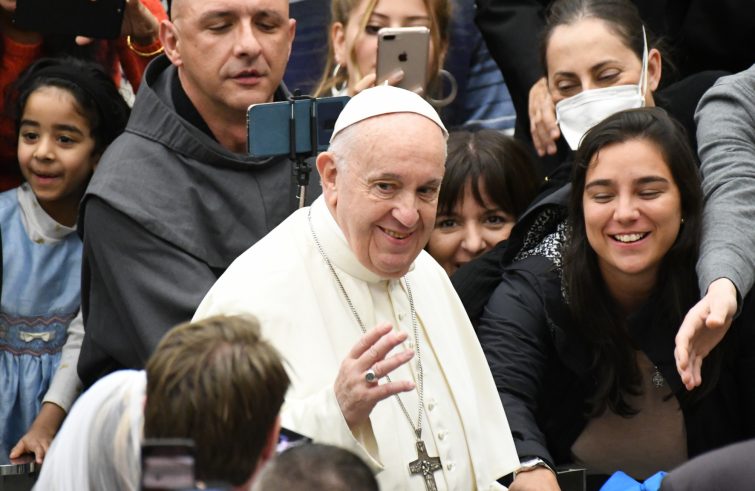
“I wish, again, to express my closeness to those who are ill with Coronavirus and to health-care workers who are caring for them, to civil authorities and to all those who are involved in assisting patients and in containing the spread of the virus”: it’s the Pope’s appeal before the closing greetings to Italian-speaking faithful, which, by tradition, conclude the Wednesday general audience in Saint Peter’s Square. Today was the third time that Francis made a public statement on the COVID-19. During the General Audience of February 12, he called upon the faithful to pray “for our Chinese brothers and sisters who are suffering from this terrible illness. May they find their way to health as soon as possible”; and after the Angelus Prayer of January 26: “May the Lord receive the deceased in his peace, comfort the families and support the great commitment of the Chinese community, which has already been set in motion to fight this epidemic.” We must ask ourselves “what the desert means spiritually, for all of us, including those of us who live in the city”, is the invitation at the heart of today’s catechesis, at the beginning of the Lenten journey which begins today, Ash Wednesday, leading up to the celebration of Easter in forty days, “the heart of the liturgical year and of the faith.”
“Lent is the propitious time to make room for the Word of God. It is the time to turn off the television and open the Bible. It is the time to disconnect ourselves from mobile phones and connect to the Gospel”
the Pope’s threefold imperative. “When I was a child – Francis added in unwritten remarks – there was no television, but there was the habit of not listening to the radio during the Lenten season: it’s the desert.” The Holy Father went on to mention, in the form of a denouncement, the stormy climate of our present times: “We live in an environment that is polluted by too much verbal violence, by so many offensive and harmful words, which are amplified by the internet.”
“Today insults are uttered as if they were daily greetings”,
he added impromptu: “We are inundated with empty words, publicity, devious messages. We are used to hearing everything about everyone and we risk slipping into a worldliness that causes the atrophy of our hearts.” “And there is no bypass to heal it, only silence”, is the Pope’s invitation to live Lent as an opportunity for a “holy ecology of the heart.” Instead, today “we struggle to distinguish the voice of the Lord speaking to us, the voice of conscience, the voice of righteousness.” Thus Lent can become a time “to renounce useless words, chatter, idle talk, gossip, and to ‘speak’ directly to the Lord.”
“Fasting is not only losing weight: fasting is reaching the essentials. It means seeking the beauty of a simpler life,
the Pope’s specification of one of the three Lenten practices. “Like bread, more than bread we need the Word of God, we need to speak with God, we need to pray”, the proposal: “For only before God do the propensities of the heart come to light and the duplicity of the soul succumbs. The desert is a place of life, not of death, a place to dialogue in silence with the Lord who gives us life.” “Let us again imagine a desert”, is the invitation to 12,000 faithful gathered in Saint Peter’s square: “The desert is the place of what is essential. Let us gaze at our lives: how many useless things surround us! We pursue countless seemingly necessary things which in reality are unnecessary.”
“How good it would do us to free ourselves from so many superfluous things, to rediscover what really matters, to rediscover the faces of those next to us!”,
Francis exclaimed: “Jesus sets the example by fasting. Fasting is being able to renounce what is futile, what is superfluous, in order to centre our lives on what really matters.”
“Even today, close to us, there are many deserts, many lonely people: they are the lonely and the abandoned.” In the last part of the audience, the Pope focused on the desert as a “place of solitude”. “How many poor and elderly people are beside us and live in silence, quietly, abandoned and discarded!”, the appeal:
“Talking about them does not hit the news.
But the desert leads us to them, to those whose voices have been hushed and who silently ask for our help. Many silent gazes that ask for our help.” Prayer, fasting, works of mercy: it is “the journey in the Lenten desert”, for “in the desert we find the path that leads us from death to life.” “Let us enter the desert with Jesus, we will leave it at Easter when the power of God’s love renews life,” he said, “and just like those deserts that bloom in spring with buds and plants suddenly sprouting from the sand, if we follow Jesus, our deserts will also bloom. Let us enter this Lenten desert, let us follow Jesus in the desert: with Him our deserts will blossom.”









